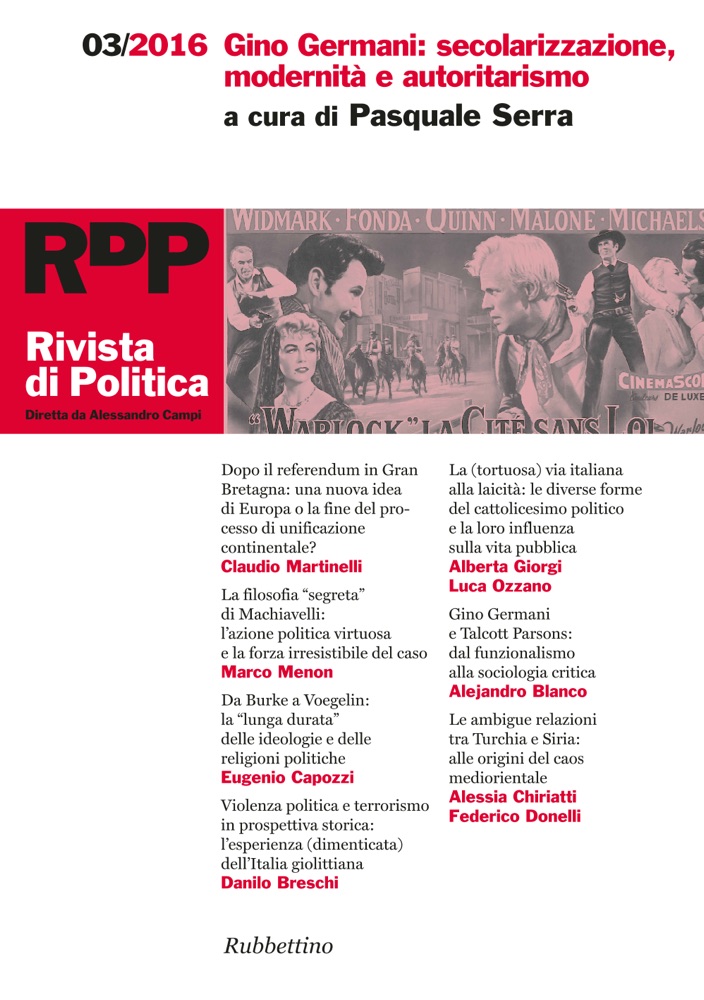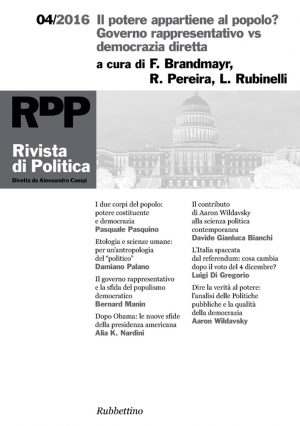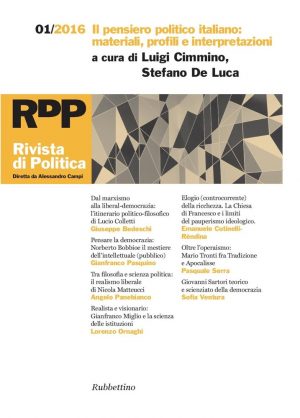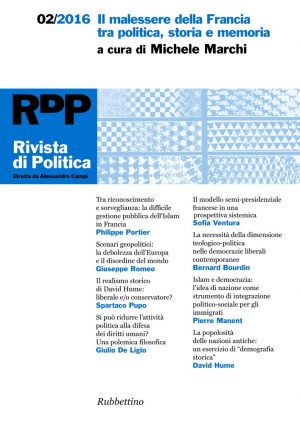03/2016 – Gino Germani: secolarizzazione, modernità e autoritarismo. A cura di Pasquale Serra
ISSN: 2037-495X
8,50€ – 11,00€
Descrizione
Sommario:
congetture & confutazioni
Should we stay or should we go?: il referendum Brexit e il suo Clash sulla politica britannica Claudio Martinelli
Modelli ed efficacia degli strumenti di contro-terrorismo: dalla diversificazione al coordinamento delle strategie Barbara Faccenda
Dopo Mare nostrum: la gestione delle migrazioni attraverso lo strumento militare Nadine Innocenzi
dossier: tra italia e argentina, la sociologia di gino germani
La vita come ricerca: Gino Germani scienziato della crisi
Il problema dell’autoritarismo moderno nel pensiero politico di Gino Germani Pasquale Serra
Gino Germani e Talcott Parsons: storia di una relazione Alejandro Blanco
Gino Germani: tra narrativa della transizione e critica alla modernità Ana Grondona
archivio del realismo politico
Burke, Voegelin e la lunga epoca delle “religioni politiche” Eugenio Capozzi
L’armatura del filosofo. Leo Strauss e la Vita di Castruccio Castracani Marco Menon
osservatorio nazionale
Cattolici, laici o multiculturalisti? La religione nel dibattito pubblico italiano Alberta Giorgi, Luca Ozzano
Disfare l’Italia per rifare gli italiani. Considerazioni sulla violenza politica fra terrorismo e rivoluzione nell’Italia giolittiana Danilo Breschi
osservatorio internazionale
Guerra e terrorismo: due fenomeni distinti? Andrea Beccaro
Le relazioni tra Turchia e Siria nel quadro della politica regionale di potenza: egemonia o leadership? Alessia Chiriatti, Federico Donelli
Abstracts
Pasquale Serra, The Problem of Modern Autoritharianism in Gino Germani’s Political Thought
The purpose of this article is to sketch a homogeneous outline of Gino Germani’s thought: each of the core topics of his thought, and all the issues that still gather over his name and his work are analytically tackled. Focused on the problem of modern authoritarianism, this work pinpoints the different stages of the development of such topic in Germani, as well as the various themes (modernity, secularization, marginality) that intersect with it at various levels of his research, from the Forties of Twentieth Century to 1979, the year of his death, and which are still today essential tools for understanding the contemporary crisis.
Alejandro Blanco, Gino Germani and Talcott Parsons: Story of a Relationship
The work of the Italian-Argentine sociologist Gino Germani is usually associated with the structural functionalist school of sociological thought whose most important figure was Talcott Parsons. A closer examination of certain aspects of Germani’s academic career and intellectual contributions offers a very different picture, which forces us to reconsider this view. Through a reconstruction of the intellectual context in which Germani read Parsons’s work, this article suggests an alternative understanding of the significance of this relationship in the formation of Germani’s portrayal of the modern world.
Ana Grondona, Gino Germani: between the “Narrative of Transition” and Critique of Modernity
The paper focuses on Gino Germani’s analysis of modernization. It shows the presence of both a “narrative of transition” on the one hand, and a critique of modernity, on the other. The text first places a set of current discussions around “development” and “modernization” with which it seeks to converse. After this introduction, the next section shows the presence of the “narrative of transition” in many of Germani’s texts, emphasizing the role played by “paradoxes” and “asynchrony” in these theorizations. Next, it focuses on the criticism made by the author to dichotomous perspectives on development and modernization. Then, it looks into the sociologist’s diagnosis around the issue of marginality/marginalization, and the role it plays in the subversion of the sequential narrative of transition. Finally, we propose some closing remarks.
Eugenio Capozzi, Burke, Voegelin, and the Long-lasting Age of “Political Religions”.
In two different historical moments – the beginning of the French Revolution and the acme of Nazi regime – Edmund Burke and Eric Voegelin have managed to identify some basic features of what some decade after Burke’s death would have been called “ideology”, i.e. the radical turn of political discourse in Western history started at the end of Eighteenth Century.
In his Reflections on the Revolution in France (1790) and in its following works, Burke had pointed his finger against the abstract doctrine of the Rights of Men and the dreams of re-building societies from their roots nurtured by the “enlightened” intellectuals of its time, which in his eyes were the main enemies of the liberties guaranteed by European constitutional tradition. Nearly a century and a half later, in a small book published in 1938, Die politische Religionen, Voegelin was the first political philosopher to describe ideologies as secularized forms of religion, whose roots lay in Gnostic doctrines, coming back to life in the form of Medieval millennialism and then as absolutistic views of politics, sovereignty, State, party.
Both Burke’s and Voegelin’s categories are still of great use today, if we want to understand the longue durée of the “age of ideologies”, and its legacy in Western political culture. In particular, they can provide relevant insight into origins and features of the new ideologies born after the end of the Cold War and at the beginning of the globalization process: identity-based new populisms on one side; the radical, hyper-subjectivist turn of Western liberal political culture on the other. Both trends may be described, in Burkean and Voegelinian terms, as varieties of secularized messianism based on a relativist worldview.
Marco Menon, The Armor of the Philosopher. Leo Strauss and the Vita di Castruccio Castracani
According to Leo Strauss, Niccolò Machiavelli formulated his innermost thought in his little, ironical work The Life of Castruccio Castracani. In the first place, this paper analyzes the philosophical depth of this Straussian statement, focusing on the singular character of Thoughts on Machiavelli as a whole (§§1-2). Secondly, it investigates the argument of the action of Machiavelli’s historical fiction, which portrays a quite unsung 14th century Italian tyrant (§§3-5). Lastly, it presents an interpretive account of Castruccio’s sayings (§6). This paper aims to show how The Life of Castruccio Castracani conveys Machiavelli’s teaching on the limits of politics, and his real thought concerning the relation between virtue, necessity, and chance.
Luca Ozzano, Alberta Giorgi, Catholic, Secular, or Multiculturalist? Religion in the Italian Public debate
In recent years, a number of controversies related to religious issues have characterized the European public debate at both the EU and the national level. The paper presents the results of the analysis of the debates involving issues related to religion in Italy in the last 20 years, namely, LGBT rights and same-sex marriages, beginning of life (abortion, stem cell research, assisted reproductive technologies), end of life (euthanasia and living will), schools and religious education, religious values in national and European identity, and issues related to minority religions and migration (places of worship, dress code). We focused on the political debate in the mass media, from an integrated perspective, which takes into account the actors, their identities, values, political strategies and alliances, on the one side, and the discursive opportunity structure, frames, and controversies’ venues, on the other. The results show the persistent influence of Catholicism on Italian politics and public debates, although this influence takes a very different shape in the platforms of different political and social actors.
Danilo Breschi, Undoing Italy to Remake the Italian Considerations on Political Violence between Terrorism and Revolution in the Giolittian Age
There is a strong link between revolutionary ideologies, political violence, and terrorist action. Together with Russia and France, Italy has been fertile soil for this kind of connection. The most intense period in which the latter has occurred were the almost twenty years between 1898 and 1914. These were the years of the first Italian industrial take-off. The aim of this article is to try to understand and assess the value (or lack thereof) assigned to violence by some of the political subcultures active in those years (anarchism, revolutionary syndicalism, and maximalist socialism). Throughout Italian society, there was widespread presence of forces that were radically antagonistic towards the constitutional monarchy and the parliamentary state. The collapse of the latter, between 1922 and 1926, might perhaps be explained by the uncompromising and aggressive detachment between the political representations of the peasant masses and the institutions of the state born of the Risorgimento.
Andrea Beccaro, War and Terrorism: Two Different Phenomena?
Today, terrorism is one of the most serious threat to international security, but it is difficult to study as well as to understand its links to war and warfare. The aim of the essay is to show both how concepts of terrorism and war are linked and how they may in part represent the same event. I will do that firstly showing that war is not only a conflict between sovereign states but on the contrary it is a more multifaceted political phenomenon; secondly showing how terrorism has been used during history as a military tactic integrated in a broader strategic context, i.e. insurgency.
Alessia Chiriatti, Federico Donelli, Turkey, Syria and Power Politics in the Regional Order: Hegemony or Leadership?
After the explosion of the revolts in Syria, in March 2011, countries in the Middle Eastern region are walking a thin line: deep crises cross their borders, while transnational fluxes cut through and get involved the whole Mediterranean Sea. In this analysis, Turkey remains the focal point: in the last decade, Ankara has tried, with limited successes, to become an important regional actor and solver of the regional crises. The relationships between Turkey and Syria and with Bashar al-Assad are the most important test of the Turkish politics. The deterministic idea of the “Strategic Depth”, theorized by the former Turkish Minister of Foreign Affairs, Ahmet Davutoğlu, and his foreign policy approach known as “zero problems with neighbors” have been put strongly to the test by the explosion of the Syrian crisis: Turkey has not succeeded to find a solution to it and to the migrants fluxes, especially without the EU’s help. The Syrian civil conflict is paradigmatic for the controversial relations between Turkey and the Middle Eastern countries.
In this paper, the relationships between Ankara and Damascus, particularly during the last decade, are elected as case study. The aim of the paper is to demonstrate that Turkey has tried to apply a regional hegemonic attitude starting from 2005, but, after the explosion of the Syrian crisis, the country has not passed the “Strategic Depth” approach. It has otherwise accelerated a revision of it, losing the appointment to build a regional power perception of itself abroad. In this sense, methodologically, the concepts of hegemony and leadership fulfill a primary importance.






